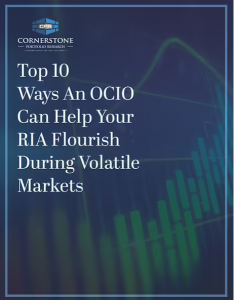As an independent broker-dealer, you understand that in an age of rampant inflation and bear markets, retention is everything. Metaphorically speaking, the clients that you service may need more than a pat on the hand. Meanwhile, regulatory concerns can’t be backburner-ed for long.
The easiest solution might be to grow your team, but hiring your own CIO could be an expensive endeavor. Many firms may find it difficult to justify within their annual budgets (even if there’s room, otherwise). This is why outsourcing CIO services might be the shrewdest move you could make right now.
These topics are explored in this article:
- Economic times are turbulent
- The most important focus is retention
- Delegate to an outsourced CIO
- Leverage Cornerstone’s experience
Economic Times Are Turbulent.
2023’s economic indicators point to another turbulent year. Some early optimists may have hoped for smoother sailing, but that looks increasingly unlikely. Continued inflation and the growing possibility of a recession both remain areas of concern for financial advisors as well as their clients.
Meanwhile, stock markets around the world are experiencing growing levels of volatility due to changing public opinions about the global economy. Once-prosperous companies are laying off employees and tightening their fiscal belts. This kind of talk may be best kept behind the counter, but we all know it’s true.
To some degree, every firm in the financial industry must now make sure that current market conditions do not destabilize their operations. In a time when even the classic 60/40 model for investing is no longer as reliable, financial professionals may find that it takes longer to analyze and rebalance client portfolios, given market volatility. Because no one has a crystal ball, watching the market’s movements is a daily necessity.
Independent broker-dealers should be proactive in addressing the requirements and obligations set forth by the Regulation Best Interest (Reg-BI) rule. To ensure compliance, you should have implemented comprehensive policies, procedures, and systems to prioritize the best interests of your clients.
Ideally, you have focused on enhancing disclosures and fostering transparency in your fee structures and investment recommendations. Regardless, the question remains: How? When there aren’t enough hours in each business day to do everything your firm, team, and clients need to begin with, additional challenges can seem almost insurmountable.
The Most Important Focus Is Retention.
At least half the correct answer may lie in our priorities. Clearly, we can’t be everything to everybody at once, so we have to consider the greatest need to focus on: Clients keep the doors open and the brick-and-mortar bills paid.
Inflation and unstable markets often spur some to develop grass-is-greener syndrome: In other words, when headlines are foreboding and they see returns diminish (regardless of how much value you consistently deliver), they tend to blame their advisor. This makes retention essential to your long-term survival as a firm.
It would be easier to cover all the necessary bases with a time machine, but we don’t have the luxury. So, somehow, even smaller firms have to find a way to make it all work.
Out-of-the-box ideas could range from lowering your AUM for cattle-call advising to cutting salaries, but these ideas generally prove far more rash than reliable.
Not Sure an OCIO Model Is Right for You? We’ve Got 12 Reasons Why It Could Be
Delegate to an Outsourced CIO
There is an option that you don’t need to take out a loan to afford: An outsourced chief investment officer (OCIO) is a third-party investment service provider who can manage the entire process of investment compliance for you.
By outsourcing these responsibilities, you could potentially free up significant amounts of time; hours and hours that would otherwise go to investment-related compliance tasks. As a result, you would be able to focus more on client hand-holding, keeping portfolios market-weather-ready, and possibly even growing your book again.
In addition to freeing up precious work hours for other tasks, outsourcing to the right CIO could provide an almost instant prestige boost for your firm: If the professional is an accredited CFA Charterholder, adding him or her to your team means bringing serious horsepower onto your roster. Despite the fact that they work with you online, you could add them to your Our Team page’s bios.
You might even want to consider optimizing your AUM. High-net-worth clients tend to be thorough in their research (or hire people who are), but they sometimes sidestep financial firms with low AUMs, simply because they believe the best service isn’t cheap.
An OCIO’s services could possibly add significant justification for increasing your fees, as well. Some are willing, upon request, to meet with your clients as needed. By definition, having an executive member of your team interact with them in this way constitutes providing a premium service. So, it’s expected that you’d price it accordingly.
If you think you can’t afford an outsourced chief executive officer, think again. Unlike adding an executive under your brick-and-mortar roof, the cost is generally less: You never have to provide a bonus, benefits, or even share your stapler. Base compensation may vary between OCIOs, but it’s generally much more affordable than an on-premises hire.
Leverage Cornerstone’s Experience

Cornerstone Portfolio Research is an independent investment research and portfolio management firm with a combined experience of over 120 years in the financial industry. We’ve built our reputation on being more than easy to work with. All of our approaches are designed to be as plug-and-play with your own as possible.
In other words, we believe you should never have to uproot methods or team members to accommodate a whole new system. Instead, our goal is to ally with you, adapting to your workflows in order to work within them alongside you. That’s why you don’t have to get new client paperwork, change custodians, or needlessly disrupt your clients’ portfolios.
Whether you’re a growing firm, a breakaway, or simply a broker-dealer who’s come to realize that reassuring clients can’t be done without freeing up time elsewhere, we’re ready to talk. Contact us to schedule a meeting.


